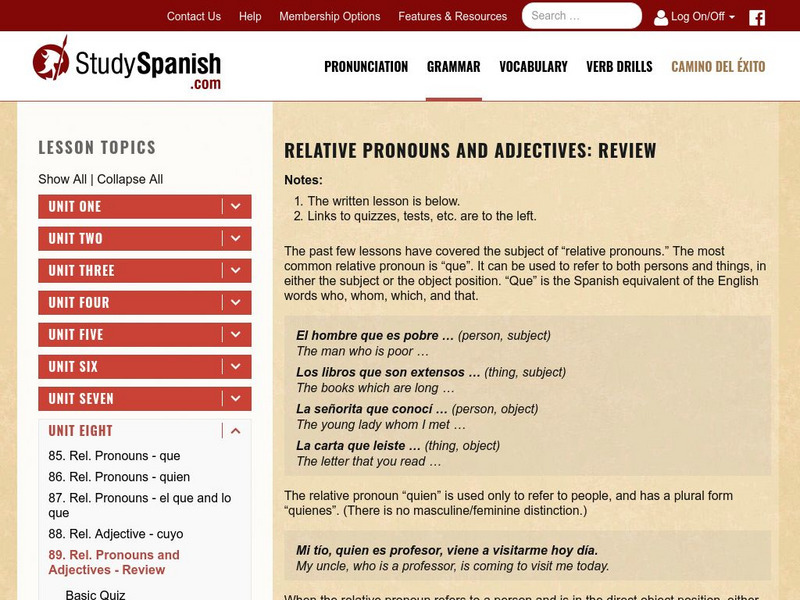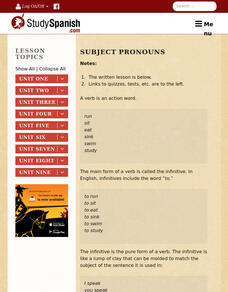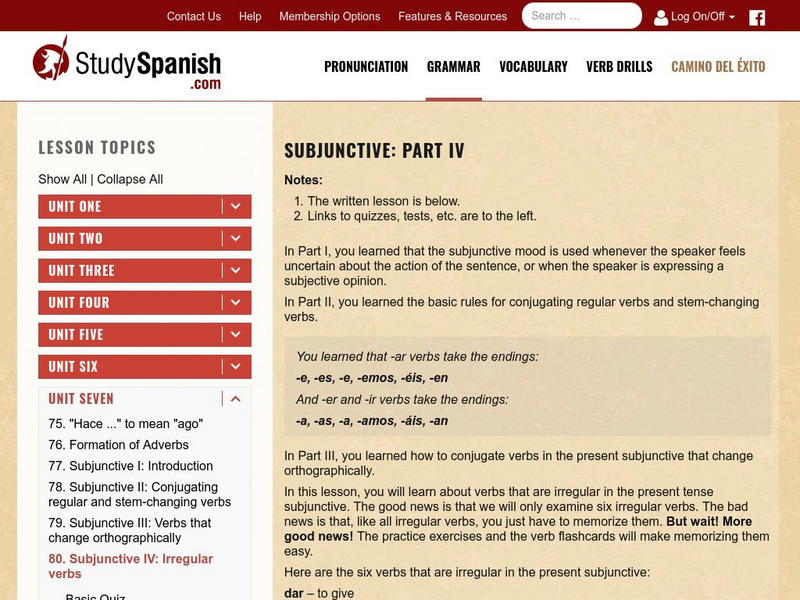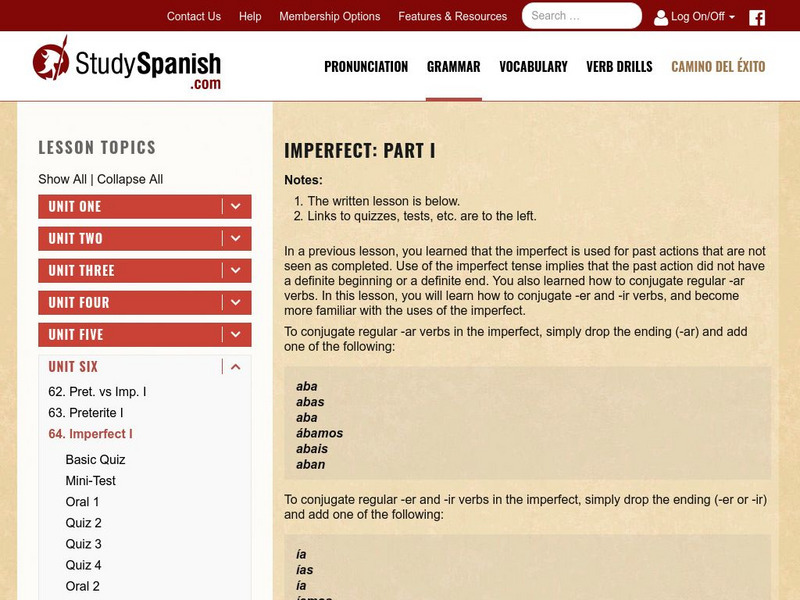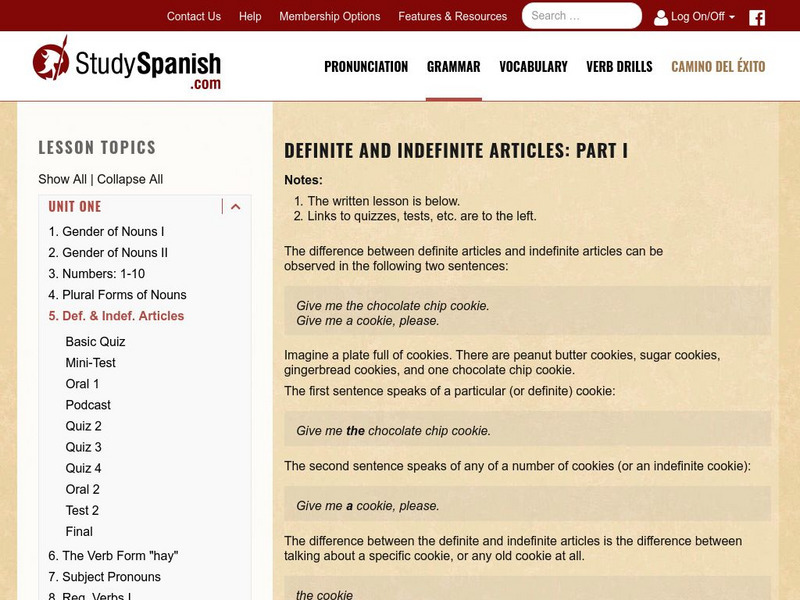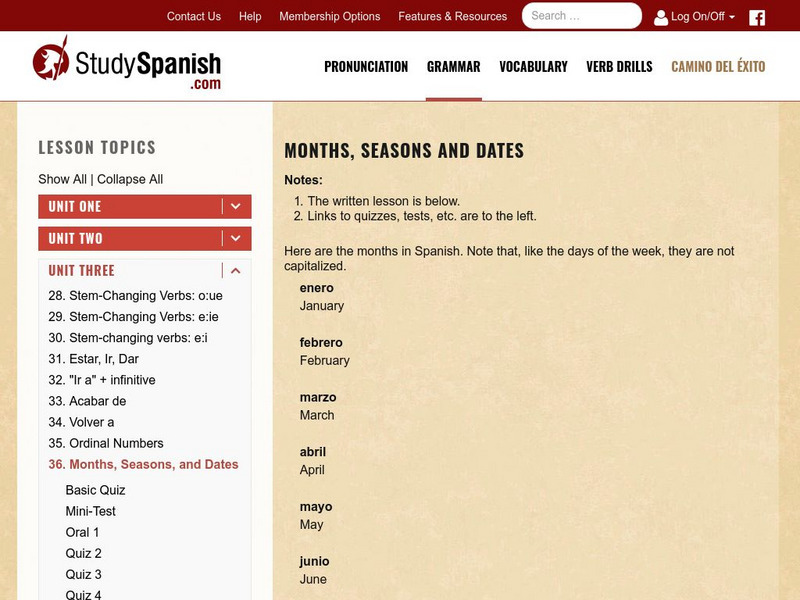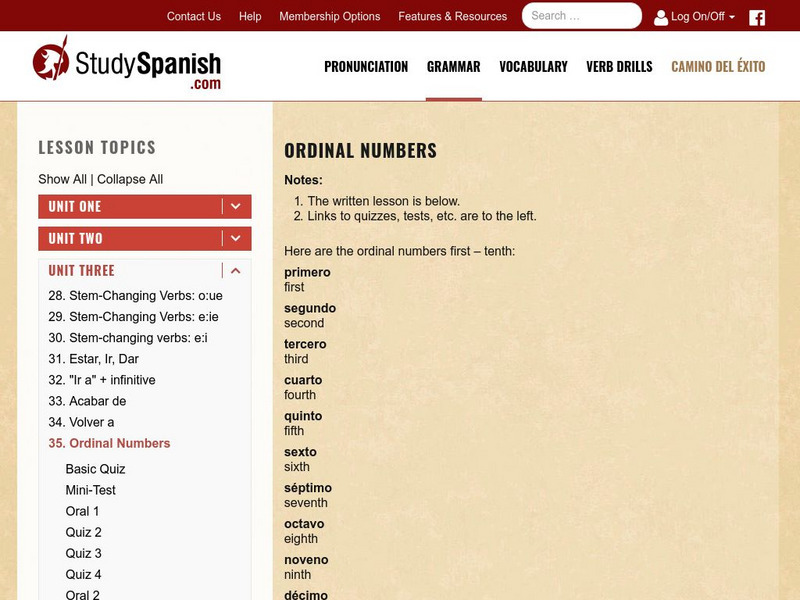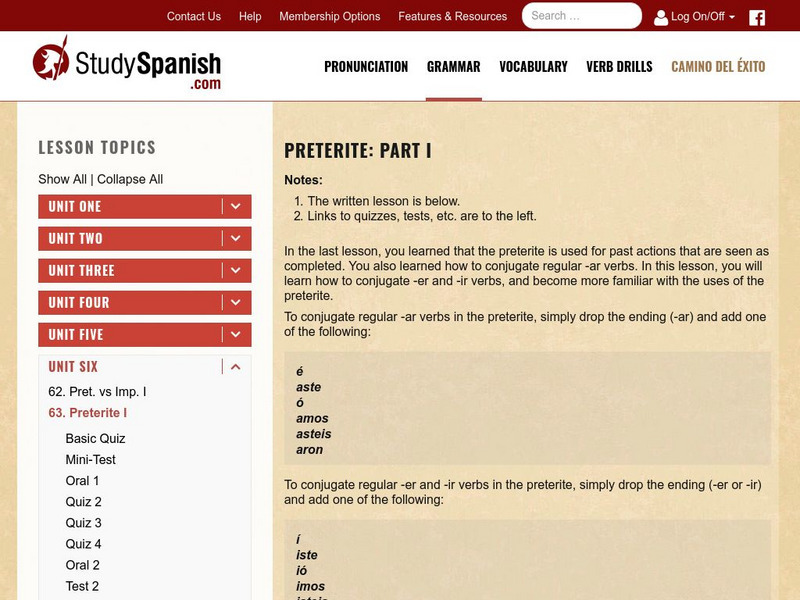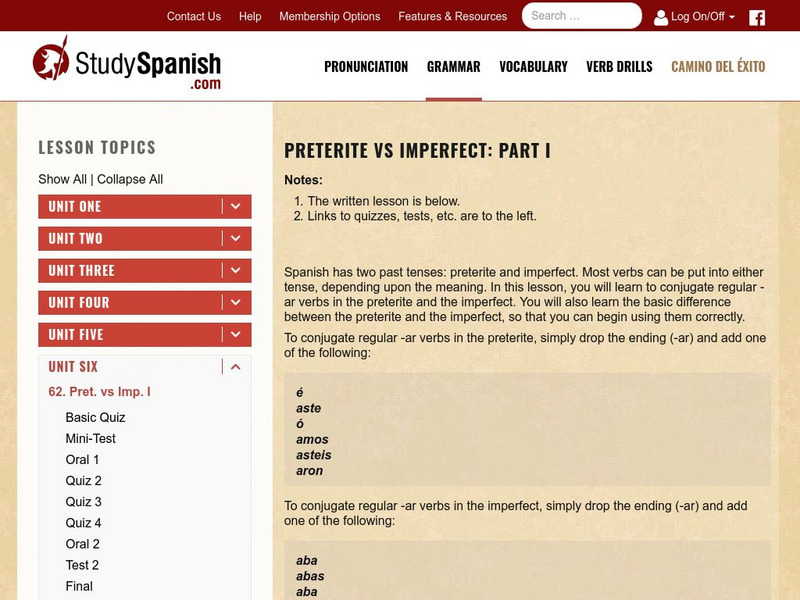Study Languages
Study Spanish: Relative Pronouns: Que
Fantastic explanation of relative pronouns with an introduction to using the Spanish relative pronoun "que." Ample examples in Spanish and English illustrate the use of "que," as a relative pronoun. Students may test their understanding...
Study Languages
Study Spanish: Relative Pronouns and Adjectives: Review
An excellent review of relative pronouns and adjectives in Spanish. Ample examples in Spanish and English illustrate their usage. Students may test their mastery of this principle with a quiz that follows the lesson.
Study Languages
Study Spanish: Subjunctive: Regular Stem Changing
Comprehensive lesson on how to conjugate verbs in the present subjunctive. Regular and stem-changing verbs are presented in this explanation. A quiz at the end of the lesson tests the student's mastery of verb conjugations in the present...
Study Languages
Study Spanish: Subjunctive: Spelling Changes
Fantastic explanation of spelling changes in the Spanish language and their effect upon conjugations in the present subjunctive. Verb infinitives that end in -car, -gar, and -zar are among those that are considered. A quiz at the end of...
Study Languages
Study Spanish: Subject Pronouns
After a brief review of what verbs and verb infinites are, this site offers a comprehensive explanation of subject pronouns. A great comparison of Spanish subject pronouns to English subject pronouns. Differences between second person...
Study Languages
Study Spanish: Subjunctive: Irregular Verbs
Great explanation of how to conjugate the six irregular verbs in the present subjunctive: dar, estar, haber, ir, saber, and ser. A quiz at the end of the lesson tests the student's mastery of irregular conjugations in the present...
Study Languages
Study Spanish
An excellent site that spells out grammar in simple-to-understand terms. Currently targets beginner level high school Spanish. Includes exercises, vocabulary, idioms, culture and even a simple translation link!
Study Languages
Study Spanish: Formation of Adverbs
Great explanation of adverbs and how they are formed in Spanish. Some of the most common adverbs are listed in this lesson. A quiz at the end of the lesson tests the student's mastery of this grammar principle.
Study Languages
Study Spanish: Cardinal Numbers: 1 10
This site is a lesson on the cardinal numbers 1-10 with an explanation of how to change the number one to match the nouns it modifies. A quiz follows the lesson to test the student's comprehension of these cardinal numbers.
Study Languages
Study Spanish: Cardinal Numbers: 31 1000
This site is a lesson on the cardinal numbers 31-1000 with an explanation of how to change the hundreds to match the nouns they modify.A quiz follows the lesson to test the student's comprehension of these cardinal numbers.
Study Languages
Study Spanish: Imperfect Part I
Excellent introductory lesson to the regular conjugations of the imperfect tense and the main rules that govern its usage. Examples in Spanish and English illustrate specific rules. A quiz at the end of the lesson tests the student's...
Study Languages
Study Spanish: Definite and Indefinite Articles
This site has an introduction on definite and indefinite articles. Examples in Spanish and English illustrate the difference between a definite and an indefinite article. Singular and plural forms are presented. Students may test their...
Study Languages
Study Spanish: Comparisons of Inequality
This site is an online lesson on comparisons of inequality, using "mas" and "menos" with adjectives, adverbs, and nouns. A great explanation of when to use "de" and "que" with numbers. The lesson is thorough and easy to understand, with...
Study Languages
Study Spanish: Imperfect Part Iii
This site is an online lesson on uses of the imperfect tense, contrasted to contradictory uses in the preterite. English and Spanish examples simplify the explanation. A quiz at the end of the lesson tests the student's mastery of this...
Study Languages
Study Spanish: Months, Seasons, and Dates
This online lesson is on the use of definite articles and numbers with months, seasons, and dates. A quiz follows the lesson to test the student's comprehension of this grammar principle.
Study Languages
Study Spanish: Comparisons of Equality
Excellent lesson on comparisons of equality, using "tan" and "tanto" with adjectives, adverbs, and nouns. The lesson is thorough and easy to understand, with ample examples. A short test at the end of the lesson tests the student's...
Study Languages
Study Spanish: Ordinal Numbers
This online lesson is on the use of the ordinal numbers 1st through 10th with an explanation of how they change to match the nouns they modify. A quiz follows the lesson to test the student's comprehension of ordinal numbers.
Study Languages
Study Spanish: Preterite Part 1
Excellent introductory lesson to the regular conjugations of the preterite tense and the main rules that govern its usage. Examples in Spanish and English illustrate specific rules. A quiz at the end of the lesson tests the student's...
Study Languages
Study Spanish: Preterite Part 2
This site is an introduction to four common irregular verbs in the preterite tense: ser, ir, dar, and hacer. A quiz at the end of the lesson tests the student's mastery of these irregular conjugations.
Study Languages
Study Spanish: Preterite Part 5
Great lesson on some of the most common irregular verbs in the preterite tense: decir, traer, ver, and producir. A quiz at the end of the lesson tests the student's mastery of these conjugations.
Study Languages
Study Spanish: Preterite Part 3
An online introduction to stem-changing verbs in the preterite tense. A quiz at the end of the lesson tests the student's mastery of these conjugations.
Study Languages
Study Spanish: Preterite Part 4
Great introduction to verbs with spelling changes in the preterite tense. A quiz at the end of the lesson tests the student's mastery of these conjugations.
Study Languages
Study Spanish: Preterite Part 6
Great lesson on some of the most common irregular verbs in the preterite tense that follow the same pattern for their endings: andar, estar, tener, caber, haber, poder, poner, saber, hacer, querer, and venir. A quiz at the end of the...
Study Languages
Study Spanish: Preterite vs Imperfect Part I
This site is an introductory lesson to the preterite and imperfect past tenses. The regular conjugations of each are presented, with brief general rules for their use. This is a great introduction without getting bogged down in all the...



